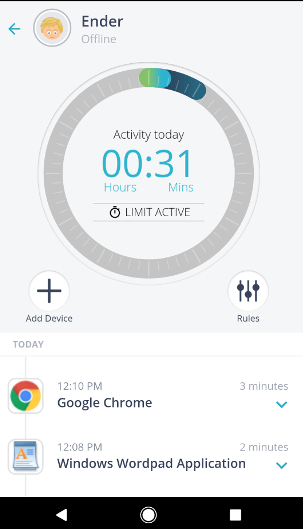
Compared to Google's Family Link, which I currently use the most, Qustodio doesn't offer a great deal extra. On February 4, 2021, the company launched Qustodio for Chromebook.) Qustodio is also very limited on iOS, so you can't set specific time limits for many apps or games on iPhones or track calls and SMS messages. ( Editor's note: This review was originally published in June 2020. My daughter has a Chromebook and there's no Chromebook support at all. While Qustodio is easy to use, it didn't work well for our family.
Qustodio review 2021 for android#
If you want to dig deeper, there's an activity timeline that logs every single action, including time spent in apps or games, web searches, web pages visited, and location information for Android phones or iPhones. You get a daily report via email that shows the same information. It's easy to review at a glance and gives you all the pertinent details.

Your child's summary tab shows you how they spend their time each day and flags questionable activity. It seems fairly accurate when they're somewhere for a while, but it's not unusual for it to be anywhere up to 100 feet out, depending on the location and how fast they're moving. The location tab shows your child's last known location for Android phones or iPhones, provided their phone is on and connected to the internet. There is a social media tracking option, but it only covers Facebook. The Calls & SMS tab shows a call log and you can even have it show your child's SMS messages on Android phones, but this feature doesn't work on iPhones. Qustodio allows you to see all the videos your child watches and what they searched for in YouTube. There's also a special YouTube monitoring tab. The games and apps section allows you to set specific daily time limits for individual apps or games, though you can only configure them once your child uses the app or game for the first time after installing Qustodio. The web filtering seemed to work well and successfully blocked most objectionable content when I tested it, though not all. By default, Qustodio will block the installation of any unsupported browser. You can choose which categories you want to block or allow, and you can set up exceptions to always block or allow specific websites. Qustodio also offers in-depth categorized web filtering controls that block pornography, gambling, weapons, drugs, and a few other kinds of content. I recommend going with the alert instead, as the block will cut them off in the middle of whatever they were doing, which can cause upset if they were chatting to a friend or in the middle of a game. If you choose to lock the device, your child will see a message telling them time's up when the limit is reached, and they'll be unable to use the device until the next day. You can also choose to completely lock the device or simply trigger an alert to let you know they've hit their limit. I found that it only locked web browsing and internet access by default, so my son was able to continue gaming beyond the limit. It's important to note that you need to choose what happens when the limit is reached. You can set daily time limits for overall screen time, and you can schedule times when devices can't be used.


I was provided with a year's premium subscription to test Qustodio for this review.
Qustodio review 2021 software#
The software is easy to use and it gives you granular control and real insight into what your kids are doing, but it doesn't work well on every platform, it raises some privacy concerns, and the subscription is expensive.Īs the father of an 11-year-old boy with a serious "Fortnite" habit and an 8-year-old girl who is often online, I was interested to try Qustodio. Third-party options like Qustodio aim to bridge that gap by offering a single point of oversight and control that will cover your child's phone, tablet, and laptop or desktop computer. While the top device manufacturers all offer some form of parental control, they don't play nicely together. Qustodio aims to do exactly that, offering an in-depth look at online activity, web filtering controls, screen time limits, and more. To keep your children safe, it's vital to consider parental controls that can filter out objectionable content, limit overall screen time, and give you some insight into what they're getting up to on the internet. Kids have a world of entertainment at their fingertips nowadays, and most will spend hours each day online or playing games … if you let them.


 0 kommentar(er)
0 kommentar(er)
